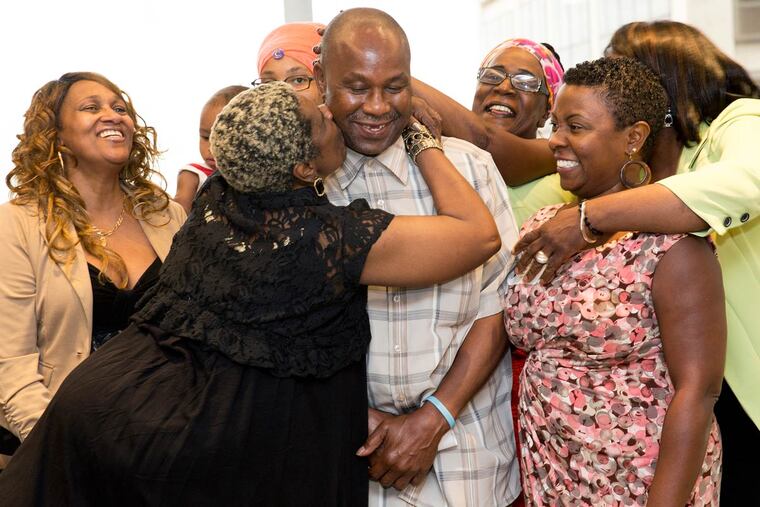After 40 years claiming innocence, Philly juvenile lifer is free
Tyrone Jones rode the elevator up to the 28th floor of One Liberty Place, a building that didn't exist the last time he was a free man, and looked out over a city transformed.

Tyrone Jones rode the elevator up to the 28th floor of One Liberty Place, a building that didn't exist the last time he was a free man, and looked out over a city transformed.
"Before I went to prison, Market Street wasn't this crowded. The sports complex, that wasn't there," he said Thursday. He was seeing the city for the first time in more than 40 years. He'd been locked up since age 16, sentenced to life in prison for a murder he's always maintained he did not commit.
He's now a month shy of his 60th birthday.
Jones was celebrating his parole with lawyers at the firm Cozen O'Connor, which, with the Pennsylvania Innocence Project, has provided him pro bono representation since 2009.
He is among the first of 300 Philadelphians to be released following a January U.S. Supreme Court decision holding that people locked up as juveniles under mandatory life-without-parole sentencing guidelines must receive a chance at liberation.
His conviction remains intact. Instead, he agreed to a new sentence - 35 years to life - and was released on parole with the support of the Philadelphia District Attorney's Office.
Hayes Hunt, Jones' lawyer, said Jones maintained his innocence through the parole process, though a typical condition of parole is expressing remorse.
"A lot of policymakers said that was an impossible hurdle that we would never overcome," he said.
Jones was convicted of shooting and killing another teen, Henry Harrison, in a gang-related execution on a North Philadelphia in 1973. Harrison, who was 17 and not involved in a gang, was shot three times on a street corner.
Jones confessed to police without his parents or a lawyer present. The Innocence Project's Marissa Bluestine said Jones' lawyer committed a "tragic" error introducing the false confessions into evidence.
Jones said he decided to choose hope over anger.
"I'm quite sure if that had happened to anybody else they would've been real mad," he said. "I just took the situation and said, I'm not going to spend the rest of my life in jail."
Still, he'll seek exoneration, through the courts or a pardon.
"We'll continue that fight," Hunt said. "But the first door that unlocked was this door, which got him home to his family."
On Thursday, his extended family was gathered in a boardroom, sharing a meal with Jones' lawyers. His sister Marsha Muhammed, 61, had been up all night cooking a spread of fried chicken, potato salad, pasta, and casseroles.
"I haven't slept in days. I'm crying one minute and shaking the next. I'm so overwhelmed," she said.
Jones will be staying with Muhammed and her husband, Malik, 61, in Chester County. The family's immediate plans: Help him adjust to life in 2016, teach him to drive, throw him a 60th birthday party - whatever kind he wants.
Choice is a novelty for Jones after 40 years of institutional living. "Where I was, you're so confined to one area. Everyone wears the same outfit: brown shirts and brown pants, no color."
He was, in fact, wearing a brown shirt and pants. But, he said, inspecting his plaid-and-khaki ensemble, "this is the outfit I picked."
215-854-5053
@samanthamelamed